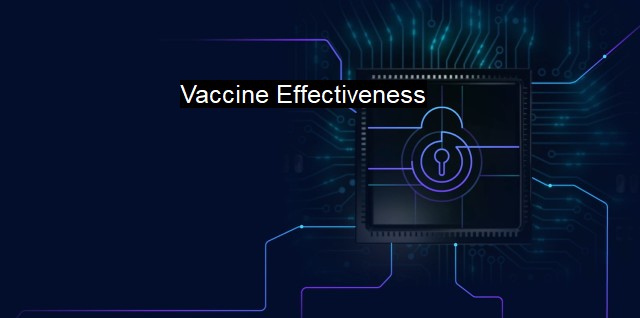What are Vaccine Effectiveness?
Exploring the Connection: Evaluating Vaccine Effectiveness in Cybersecurity and Antivirus Protection
Vaccine Effectiveness is a concept widely used within the public health context, particularly when assessing the efficiency of vaccines available for various diseases. the analogy between medicine and cybersecurity is not uncommon, as numerous parallels can be drawn between the characteristics of physical agents infecting a human body and viruses spreading in a network. "Vaccine Effectiveness" can be interpreted as the efficiency of antivirus software or a security system in protecting against various types of malware attacksTo simplify, the antivirus software works as a vaccine does. It prepares your system effectively against threats and battles them even before they try to penetrate your networks, serving as leverage to potentially harmful software and invasive operations that might lead to system breakdown or data theft. When referring to "Vaccine Effectiveness" in this light, we're looking at how well the antivirus application can detect, deter, and destroy incoming viruses, network anomalies, or cyber threats, similar to how a vaccine uses a weakened agent to stimulate bodily defenses.
Cybersecurity vaccines, more commonly known as antivirus applications, work towards identifying potential threats. The existing database in these applications containing data about various known viruses and their impacts helps the software to identify any anomaly that fits the pattern. This mode of action strengthens the system’s defensive abilities and fortifies its immune responses just as a medical vaccine improves body immunity.
"Vaccine Effectiveness" is hence determined by the ability of this cybersecurity tool to guard against, detect, and eliminate cyber threats. Some indicators of a good cybersecurity "vaccine" are its ability to adapt to evolving cyber threat landscapes. Cybersecurity threats evolve rapidly, therefore antivirus applications need to be proactive, predicting and guarding against new and emergent threats to maintain maximum protective efficiency.
Another governing factor is the system's ability to learn from past experiences and adapt. Much like how regular vaccines incorporate combat strategies against variations of a disease, antivirus applications should learn and adapt from previous virus invasions. In doing so, it secures vulnerabilities, patches loops, and keeps the system highly resistant towards possible future threats.
Thirdly, an effective 'cybersecurity vaccine' will not hamper routine operations. Just as a potent medical vaccine builds immunity without significantly disrupting the patient's normal life, a competent antivirus application shields critical data and network infrastructure from breaches and virus attacks without obstructing the system's effective functioning. Any software that paralyzes a system is neither efficient nor effective.
Lastly, just as medical research advocates for vaccine boosters to increase disease resistance, constant updates in antivirus applications can considerably amplify the overall security status. These updates accommodate the vaccination platform to brace against virus variants and mutations, thereby maximizing "Vaccine Effectiveness".
In the context of antivirus suites and cybersecurity, "Vaccine Effectiveness" can be construed as the degree to which the antivirus application or cybersecurity system protects the network or system against existing and potential threats. A well-designed, adaptable, proactive, non-intrusive, and frequently updated 'cybersecurity vaccine' can duly guard a system against rampant and ruthless cyber-attacks. Similar to medicinal data these metaphorical vaccines can never offer a hundred percent safety guarantee. Hence, while it is critical for everyone to be equipped with robust antivirus software, an informed and cautious approach to the cyber world is equally crucial. Understanding that digital hygiene, similar to physical hygiene, is as necessary as a potent vaccine bolsters the overall defenses, thus elevating "Vaccine Effectiveness".

Vaccine Effectiveness FAQs
How effective are vaccines against cyber threats and viruses?
Vaccines, in the context of cybersecurity and antivirus, refer to updates that mitigate or eliminate vulnerabilities and threats. The effectiveness of vaccines varies depending on the type and severity of the threat, but they can significantly reduce the risk of compromise or infection.How can we measure the effectiveness of cybersecurity vaccines?
The effectiveness of cybersecurity vaccines can be measured by monitoring the incidence of attacks or infections before and after the vaccine is applied. A reduction in the number of incidents and the severity of their impact indicates an effective vaccine.Do cybersecurity vaccines provide complete protection against threats and viruses?
No cybersecurity vaccine can provide complete protection against all possible threats and viruses. New threats and vulnerabilities emerge constantly, and vaccines may not be available or effective for all of them. However, vaccines can significantly reduce the risk of compromise and minimize the impact of attacks when they occur.How often should we update our antivirus vaccines to maintain their effectiveness?
Antivirus vaccines should be updated regularly to maintain their effectiveness against new and evolving threats. Updates can include bug fixes, threat signatures, and new features that enhance protection. Most antivirus software providers release updates automatically, but users should ensure they are installed promptly.| | A | | | B | | | C | | | D | | | E | | | F | | | G | | | H | | | I | | | J | | | K | | | L | | | M | |
| | N | | | O | | | P | | | Q | | | R | | | S | | | T | | | U | | | V | | | W | | | X | | | Y | | | Z | |
| | 1 | | | 2 | | | 3 | | | 4 | | | 7 | | | 8 | | |||||||